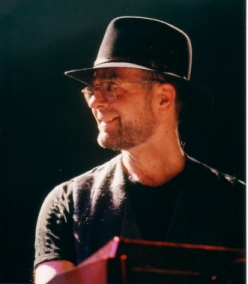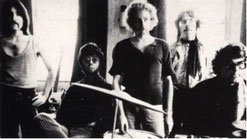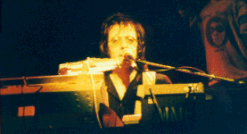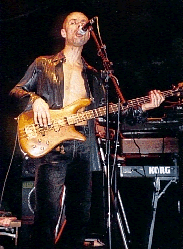Manfred Mann (1971 - to date)
With over 50 years in music Manfred Mann has lived through all of the major changes the industry has experienced, The 60's pop boom, prog, punk, the new romantics and boy band mania. He has
successfully re-invented his career on a number of occasions, riding the 60's pop wave, experimenting with heavy jazz rock and launched his own prog band (as a way of being able to escape the
restrictions of the three minute pop song) whilst still managing to score a number of hits with his new band, including a No1 in the States. Along the way he built up a reputation for
terrorising rock journalists and most of all interpreting other peoples songs. From the outset Manfred has been best known as an interpreter of other performer’s material, often
selecting obscure or undiscovered tracks and adding his own interpretation, resulting in a very different take on the source material. Bob Dylan, Bruce Springsteen, Mike Heron, Sting,
Paul Weller, Del Amitri, Super Furry Animals, Abba plus many more have all been given the Manfred treatment resulting in many memorable singles, album tracks or live songs.
Manfred Mann (born Manfred Lubowitz) was born to a wealthy family in Johannesburg, South Africa on October 21, 1940. At 19 he studied classical music at Johannesburg Witwatersrand University but was exposed to jazz through a number of sources. In late 1961 he moved to the UK to develop his talents outside of South Africa. To maintain his permanent residence, Manfred played jazz piano and taught music and harmony theory and it was during this time that he adopted the name Manfred Manne for his writing for Jazz News. The name was derived from another jazz performer, the drummer Shelley Manne. The ‘e’ would eventually be removed to become Manfred Mann.
During the 1960’s, Manfred was a founder member of the hugely successful group Manfred Mann (named at the suggestion of their label’s producer). A string of hits in both the UK and to a lesser extent the US meant they were rarely out of the charts. It was during this time that Manfred first showed his talent at interpreting other peoples material with hits obtained from songs such as 'Do Wah Diddy Diddy' (The Exciters), 'Just Like A Woman' and Mighty Quinn' (Bob Dylan) and 'Pretty Flamingo' (Mark Barkan).
Frustrated with the limitations and image of being seen purely as a hit singles band the group split in 1969. Manfred and Mike Hugg formed their next band, Manfred Mann Chapter III in 1969 and over the next 2 years or so played a brand of jazz rock that was far ahead of its time. The costs and constraints of Chapter III led to its eventual demise and Manfred parted ways with his long time collaborator.
The British progressive movement came into being during the late 60's, generally based on keyboards and guitar virtuosity the approach always consisted of longer songs, expressive playing styles and heavy musical statements with meaningful lyrics. This new approach attracted Manfred as he felt it offered him a way out of the constraints both the 60’s pop band and the later jazz rock band had imposed on him. Progressive music offered him the freedom he was seeking. In 1971 he formed his new band, a four-piece called Manfred Mann's Earth Band, and immediately took them out on tour, living up to their name and visiting Australia very early in their fledgling career. The group rapidly developed a reputation as a fine live band and released a string of albums over the next few years. 1973 saw their first chart success with 'Joybringer', this included an arrangement of Gustav Holst's 'Jupiter, Bringer of Jollity'. Classical references in his music would become a recurring theme over the following years.
1975 saw the first line-up change in the band and was followed by the hugely successful album ‘The Roaring Silence’ in 1976. Bruce Springsteen’s ‘Blinded By The Light’ was given the full treatment and to this day is hailed as a superb interpretation, very different to the source version. The track reached No 1 in the U.S. and No.6 in the UK. The follow up album 'Watch' included the bands other major hit, 'Davy's On The Road Again', a Manfred interpretation of a Robbie Robertson/ John Simon song, again showing his ability to spot a song and enhance it. 'Watch' established Earth Band as a major act in continental Europe.
Further albums followed upto 1987 at which time Manfred took time out to experiment with new songs and to look for further hits. Encountering a book on North American Indians he recorded his first solo album, his personal favourite 'Plains Music', scoring a No 1 hit in his native South Africa with the single off the album.
1991 saw the re-emergence of Manfred Mann's Earth Band, regular tours of Europe, in particular Germany and Scandinavia ensued and two further albums. Manfred has continued to find new songs to interprete, revisiting old friends including Bob Dyland and Bruce Springsteen as well as new artists such as The Super Furry Animals and is continually experimenting with music whilst at home or on the road.
2014 saw the release of his second solo album, Lone Arranger, using his talents to provide different takes on very well known 'anthems' of modern pop and rock.
When will he hang up his keyboards? In his own words, he will carry on playing as long as the phone keeps ringing and people want to listen to his music.



Mick Rogers (vocals and guitar) 1971 - 1975 & 1986 to date
Mick comes from a musical background. His Dad was a drummer and his uncle a string bass player and the young Mick was weaned on 50’s rock and roll. He first started working in music
during a summer season as a guitarist at a holiday camp. Later he joined hit Australian bands Nory Rowe and the Playboys, followed by Procession, who were produced in the UK by Mike
Hugg. Mick returned to England at Manfred's request to join Manfred’s new band, recording six albums and one major hit single, Joybringer, which he co-wrote.
Mick left Earth Band after Nightingales and Bombers, first returning to Australia, then coming back to the UK to form Aviator who made a couple of albums on the Harvest label. He continued to do session work for Manfred and played live with The Dave Kelly Band, rejoining MMEB in for the 1986 'Criminal Tango' tour. In the early 90’s he was part of a sell out world tour with Joan Armatrading. Mick is also a prolific song writer and has produced other artists, including The Hot Rods.
While continuing to tour and record with Earth Band to this day, Micj has also released two solo albums, Back to Earth (2002) and Sharabang (2013).


Steve Kinch (Bass Guitar) 1985 to date
A glass blower by trade Steve has been playing guitar since the age of 12, turning professional when about 20 years old. Steve's first taste of the big time was joining Hazel O'Connor's
band in 1980 which toured the UK Europe and The States. In 1984 he joined Jim Capaldi for a US tour which in the event was never to happen. In 1985 Steve joined Earth Band during the recording of
the Criminal Tango album.
He did the tour and also worked on the Masque album. In the long gap following Masque Steve toured the world with the well known 70’s band The Rubettes. Steve has however remained with Earth Band
touring extensively since the 90’s to date. He has also featured on the live album Mann Alive, and the studio albums Soft Vengeance and 2006.

Robert Hart (Vocals) 2010 to date
Robert Hart (Born in Poole, Dorset) is considered within the music industry as an outstanding, multitalented rock vocalist / hit songwriter from the uk.
Performing since the early 1980's when he joined the Distance he co-wrote and recorded their first album "Under the One Sky" that gained success in a in a worldwide market with particularly high sales in Japan. Robert moved to Atlantic Records as a solo artist, writing and recording his first Album "Cries and Whispers".
Robert then got signed by Disney owned Hollywood Records and with Bernard Edwards wrote the soundtrack for the Whoopi Goldberg film "The Burglar" and then recorded his second Album self titled "Robert Hart" which charted in more than 18 countries, and followed that up with several more 3 track singles including "Heart and Soul", "Boys on the Corner", "Fooled Around and Fell in Love" and the first "Angel", all of which charted or topped the charts in 20 Countries around the world
During the early 1990's, Robert was sought after by several major bands for his singing,stage presence and song writing abilities; when in 1992, Bad Company founder Mick Ralphs with Simon Kirke asked him to replace Brian Howe (former Ted Nugent Vocalist) who fronted the band following the reformation in 1986.
Robert performed with Bad Company on a trial basis, becoming popular with both the band and public especially in the USA and Canada, A contract was drawn up in july 1994 by Alliance Artists and Legend Management, Inc. signed by the Bad Company line up of the time: Mick Ralphs, Simon Kirke, Robert Hart, Rick Wills and Dave Colwell giving Robert the right to perform, write and record songs, albums and receive royalty payments as a full Bad Company member.
Robert co- wrote the Bad Company albums 'Company of Strangers', 1995 and 'Stories Told and Untold' 1996. Between 1994 and 2001, Bad Company performed at great venues, such as Madison Square Garden and The Superbowl to crowds of up to 100,000 people,during seven world tours.
After Bad Company, Robert became the frontman with the Jones Gang forming the trio with Kenney Jones in 2001.
In March 2011 Robert joined the Earth Band as the new singer, replacing Pete Cox. He has performed with the Earth Band since and has recorded some new material as yet unreleased.

John Lingwood (Drums) 1979-1986 & 2016 to date
Born in Wembley, John started playing drums after being influenced by the Beatles and other sixties bands. He started touring Europe and the U.K. in the late sixties after deciding against a
career in professional football. In the early 70's he joined Steamhammer, staying with them for two and a half years. For the next couple of years John tried several unsuccessful attempts at
forming bands and also started working more as a studio musician.
In 1974, he joined Stomu Yamashta's East Wind and later that year went on to join Leo Sayer. On leaving Leo in 1975, he concentrated on studio work and had spells in the orchestra of 'Hair',
'Jesus Christ Superstar' and 'The Rocky Horror Show'.
During this period he also toured and recorded with Chris Farlow, Dave Greenslade, Maddy Prior, Arthur Brown, Brook Benton and others, plus another unsuccessful attempt to form a band.
In early 1979 he joined the Earth Band playing with the band until 1986. After leaving the band he performed with the Company Of Snakes between 1998 and 2002 and a host of other bands after that.
John re-joined Earth Band in 2016.
Earth Band albums:
Chance
Somewhere In Africa
Live In Budapest
Criminal Tango
Masque

